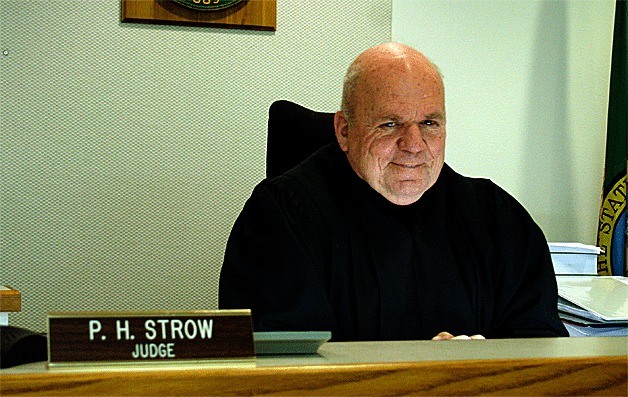Peter Strow will take off his judge’s robe at the end of March and may never put it back on.
Strow surprised many when he announced earlier this year that he will retire in the middle of his four-year term.
He is the elected judge for Island County District Court and also acts as the Municipal Court judge for Oak Harbor, Coupeville and Langley. He adjudicates misdemeanor crimes and civil matters.
With his gravelly voice and gruff manner, Strow was well known on Whidbey Island during his 16 years on the bench. Strow noted that no other elected official has as much interaction with the public as he does.
And he takes that responsibility seriously.
“It’s really important to have a good judge on the bench. It’s incredibly important to the community,” he said. “A judge’s job is to contribute to a civil society and promote respect for the law.”
Oak Harbor attorney Bill Hawkins is Strow’s friend, ally and former boss. He said he hopes to succeed Strow on the bench, but admits he leaves very big shoes to fill.
“Peter has a reputation that extends beyond Island County of being good, dependable, reliable and fair. He’s very bright and intellectually honest,” he said. “He’s just a decent human being and one of my favorite people.”
Strow, a Langley resident, said he decided to retire for several reasons. At 71, he said he’s getting on in years. He and his wife both have health concerns. They want to spend more time with their grandchildren.
And there was a motorcycle accident. Strow was an avid racer and regularly rode to work on a motorcycle.
He was seriously injured and nearly died from a head injury in 2011 when a deer collided with his motorcycle in Coupeville.
“The motorcycle accident was really an epiphany,” he said. “I realized I wasn’t invulnerable. I’m not going to live forever.”
Strow attneded Princeton as an undergraduate. He entered the Navy and was a fighter pilot in Vietnam before going to law school.
After earning his law degree, he entered the Navy JAG Corps and worked his way up to become a senior judge, which meant traveling all over the world to hear major cases. As a judge, he oversaw five capital murder cases during his career, though none of them resulted in the death penalty.
After 24 years of active duty, Strow retired from the Navy. He worked for a year as the prosecutor for a regional drug task force in Wenatchee and then went into defense work in Seattle for a year.
Strow was stationed at Whidbey Island Naval Air Station during his 24 years of active duty.
He said his wife enjoyed the climate on the island because it was similar to her native England. So he applied to become the chief criminal deputy prosecutor in Island County.
Hawkins was the elected prosecutor at the time and worked with Strow when he was the JAG officer at NAS Whidbey.
Hawkins said he was impressed with Strow’s experience and intelligence; he points out that Strow earned a perfect score on the law school entrance exam.
Hiring Strow was an easy decision, Hawkins said.
Strow’s job was to prosecute the majority of felony crimes, though it was a relatively quiet period in Island County.
He only handled one murder case in his tenure. An Oak Harbor woman confessed to a neighbor that she killed her daughter’s husband; the man’s cause of death, however, originally was classified as the result of an accidental fire, so police hadn’t investigated the crime scene.
The woman was acquitted.
Strow threw his hat in the mix when the District Court judge retired in 1997. The county commissioners appointed him to the position.
The judge credits his loyal staff with ensuring that the busy court runs smoothly. He said that nearly everyone working at the court has been there as long as he has.
Maggie Paczkowski was court administrator for just two years before Strow took the bench. She describes him as “a multi-faceted individual” and said she learned a lot from him.
“When I asked the staff to use just one word to describe him, these are some of their words — knowledgeable, fair, compassionate, demanding, honest, dedicated, thorough, stubborn, wise and dignified,” she said.
On the bench, Strow said he strives to treat everyone with “the respect they deserve,” he said. He makes sure to have as much information as possible — from criminal backgrounds to records of court hearings — on each defendant who comes before him.
“I’ve learned that most criminals just want to be listened to,” he said. “They are willing to take their lumps, but they want to be treated fairly.”
Colleen Kenimond, a former deputy prosecutor, said she has a lot of respect for the way Strow runs his courtroom. He never rushes, but gives each defendant his attention.
“The most important thing to him was making sure that those who came before him understand what was happening to them and understood their rights,” she said.
On the other hand, Strow can be impatient, particularly with some of the young attorneys who come before him, said collegues.
“He can be a little hard on people, a little gruff and grumpy, but when you get to know him he’s a teddy bear,” Hawkins said, adding that the court is an excellent training ground for new attorneys.
Strow said he is proud to have served the community in such an important role and says that he’s very good at being a judge.
Still, he says it’s not something he can say he enjoys, though he will miss his staff greatly.
“The courtroom is awash in an atmosphere of anger and fear. I send people to jail and take money from them,” he said.
“You wouldn’t want someone who enjoys being a judge.”




